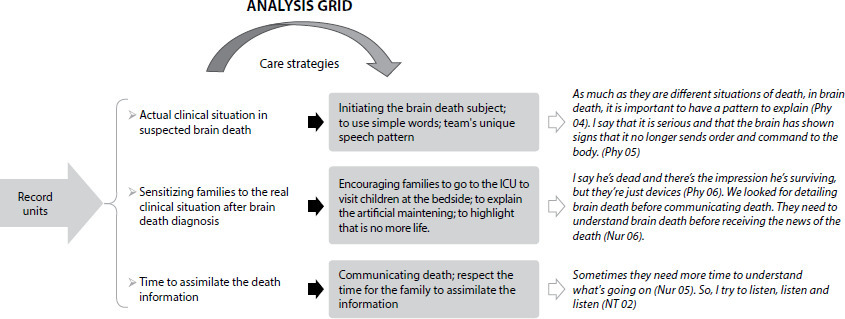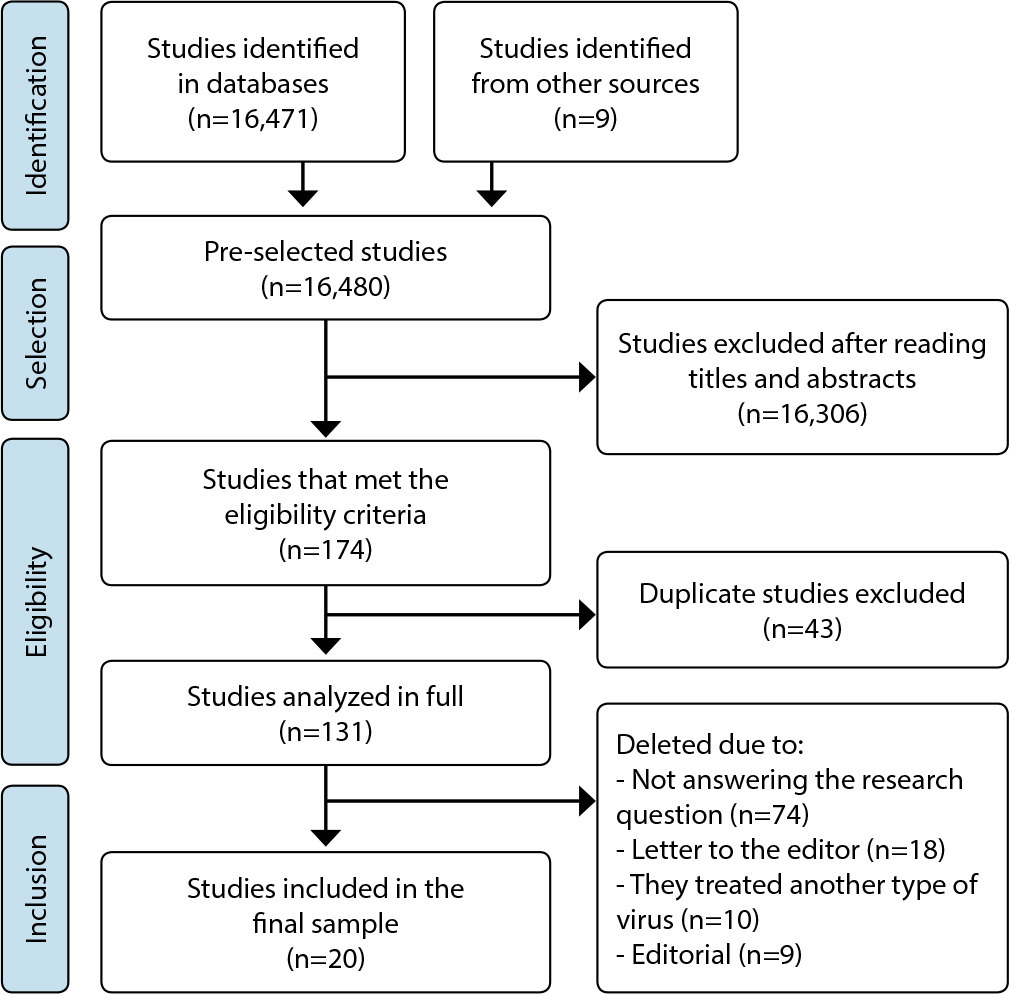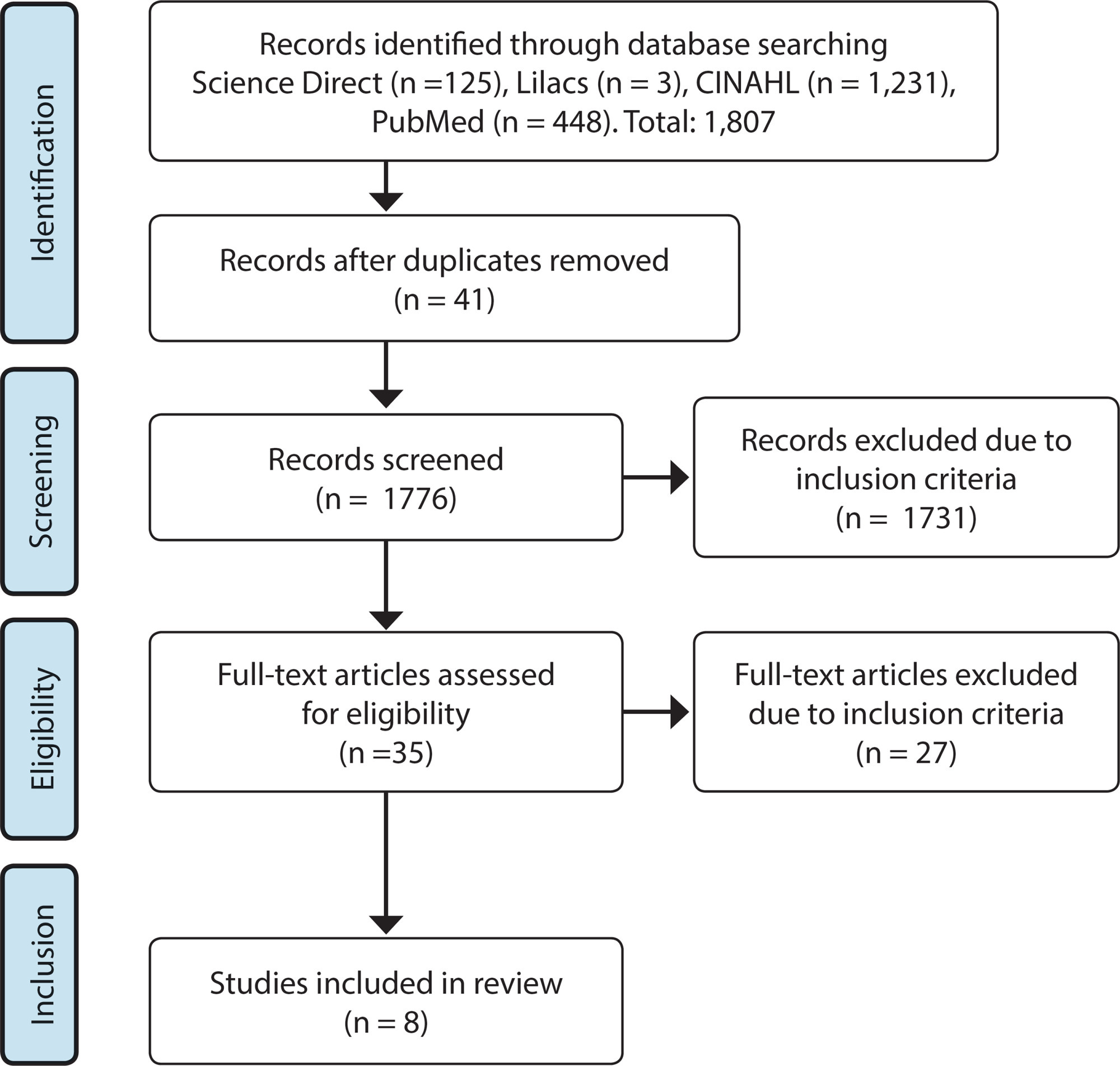-
ORIGINAL ARTICLE
Occurrence and preventability of adverse events in hospitals: a retrospective study
Revista Brasileira de Enfermagem. 2023;76(3):e20220025
07-10-2023
Resumo
ORIGINAL ARTICLEOccurrence and preventability of adverse events in hospitals: a retrospective study
Revista Brasileira de Enfermagem. 2023;76(3):e20220025
07-10-2023DOI 10.1590/0034-7167-2022-0025
Visualizações0Ver maisABSTRACT
Objectives:
to analyze the incidence of preventable adverse events related to health care in adult patients admitted to public hospitals in Brazil.
Methods:
observational, analytical, retrospective study based on medical records review.
Results:
medical records from 370 patients were evaluated, 58 of whom had at least one adverse event. The incidence of adverse events corresponded to 15.7%. Adverse events were predominantly related to healthcare-related infection (47.1%) and procedures (24.5%). Regarding the adverse event severity, 13.7% were considered mild, 51.0% moderate, and 35.3% severe. 99% of adverse events were classified as preventable. Patients admitted to the emergency room had a 3.73 times higher risk for adverse events.
Conclusions:
this study’s results indicate a high incidence of avoidable adverse events and highlight the need for interventions in care practice.

-
ORIGINAL ARTICLE
Brain death communication with parents of children and adolescents: care strategies
Revista Brasileira de Enfermagem. 2022;75(3):e20210943
09-23-2022
Resumo
ORIGINAL ARTICLEBrain death communication with parents of children and adolescents: care strategies
Revista Brasileira de Enfermagem. 2022;75(3):e20210943
09-23-2022DOI 10.1590/0034-7167-2021-0943
Visualizações0Ver maisABSTRACT
Objectives:
to identify care strategies developed by professionals from critically ill patients’ units in communicating BD with parents of children and adolescents.
Methods:
an exploratory and descriptive research with a qualitative approach, carried out in two health institutions between October and December 2019, through semi-structured interviews. Data analysis took place through content analysis.
Results:
twenty-one professionals participated. Three care strategies were identified: actual clinical situation in suspected brain death; sensitizing families to the real clinical situation after brain death diagnosis; and time to assimilate the death information.
Final Considerations:
the care strategies for communicating brain death to families identified in this study present the possibility of subsidizing health managers in training and support promotion for professionals in care practice. Moreover, they can be incorporated and validated in the care practice of the studied context.

-
REVIEW
Onco-hematological patient care in times of COVID-19: a scoping review
Revista Brasileira de Enfermagem. 2022;75(Suppl 2):e20210892
09-19-2022
Resumo
REVIEWOnco-hematological patient care in times of COVID-19: a scoping review
Revista Brasileira de Enfermagem. 2022;75(Suppl 2):e20210892
09-19-2022DOI 10.1590/0034-7167-2021-0892
Visualizações0Ver maisABSTRACT
Objective:
to identify and map health care aimed at onco-hematological patients in times of Coronavirus 2019.
Methods:
this is a scoping review, anchored in the Joanna Briggs Institute theoretical framework, registered in the Open Science Framework, with searches carried out in June 2021, through searches in the databases.
Results:
a final sample consisting of 20 articles was obtained, with emphasis on general care, treatment and stem cell donation. The most reported care was the use of telemedicine, screening for Coronavirus Disease 2019, compliance with prevention practices and, in case of infection, postponing procedures.
Conclusions:
the study gathered the main evidence on care aimed at treating these patients in times of a pandemic. Such measures help in the clinical management with the objective of proceeding with treatment amidst the injuries caused, thus minimizing possible complications.

-
REVIEW
Nursing assistance in patient care with external ventricular drain: a scoping review
Revista Brasileira de Enfermagem. 2021;74(2):e20190796
04-16-2021
Resumo
REVIEWNursing assistance in patient care with external ventricular drain: a scoping review
Revista Brasileira de Enfermagem. 2021;74(2):e20190796
04-16-2021DOI 10.1590/0034-7167-2019-0796
Visualizações0Ver maisABSTRACT
Objectives:
to map the available evidence about nursing care aimed at adult patients using external ventricular drain.
Methods:
this is a review using the scoping review method.
Results:
Initially, 965 studies were identified and, after the eligibility criteria, a sample of 54 publications was obtained. Each of them was assessed according to GRADE, resulting in three studies with high quality; 14 with moderate quality; 32 with low quality; and five with very low quality. It was highlighted 20 nursing care subdivided into nine categories, namely: drainage system; bed positioning and mobilization; catheter care; monitoring of intracranial pressure; and medication administration.
Conclusions:
the scoping review made it possible to identify the main nursing care directed to adult patients undergoing placement of external ventricular drain from the evidence available to date.

-
REVIEW
Hope-based interventions in chronic disease: an integrative review in the light of Nightingale
Revista Brasileira de Enfermagem. 2020;73(suppl 5):e20200283
12-21-2020
Resumo
REVIEWHope-based interventions in chronic disease: an integrative review in the light of Nightingale
Revista Brasileira de Enfermagem. 2020;73(suppl 5):e20200283
12-21-2020DOI 10.1590/0034-7167-2020-0283
Visualizações0Ver maisABSTRACT
Objective:
To identify the available evidence in the scientific literature about the strategies or interventions used to promote hope in people with chronic diseases.
Method:
An integrative literature review of literature published between 2009-2019, which was conducted in online browsers/databases: b-On, EBSCO, PubMed, Medline, ISI, SciELO, PsycINFO, Google Scholar. Forty-one studies were found, of which eight met the inclusion criteria.
Results:
Most studies used a quantitative approach. There was a predominance of studies from Asia and America, addressing patients with multiple sclerosis, diabetes, congestive heart failure, and cancer. Hope-based interventions were categorized by the hope attributes: experiential process, spiritual/transcendence process, rational thought process, and relational process.
Conclusion:
Hope-based interventions, in its essence, are good clinical practices in the physical, psychological, social and spiritual domains. This is congruent with the vision of nursing, first proposed by Florence Nightingale. There seem to be gaps in the literature regarding specific hope promoting interventions.

-
REVIEW
Telenursing in care, education and management in Latin America and the Caribbean: an integrative review
Revista Brasileira de Enfermagem. 2020;73(suppl 5):e20190317
09-30-2020
Resumo
REVIEWTelenursing in care, education and management in Latin America and the Caribbean: an integrative review
Revista Brasileira de Enfermagem. 2020;73(suppl 5):e20190317
09-30-2020DOI 10.1590/0034-7167-2019-0317
Visualizações0Ver maisABSTRACT
Objective:
Analyze the knowledge generated about telenursing related to the roles of nurses (care, education and management) in Latin America and the Caribbean, based on scientific evidence.
Methods:
Integrative review, for the years 2009 to 2019, in scientific databases from Latin America and the Caribbean. Twelve articles were selected.
Results:
Nine studies focused on care and three on education. The information and communication technology used in the studies was telephony directed toward non-communicable diseases. There were concerns about the remote communication process. With respect to education, two focused on educating health teams and one on educating patients.
Conclusion:
It is necessary to conduct studies on telenursing that generate changes in care practices, explore information and communication technology resources and provide communication training focused on this new care model.

-
ORIGINAL ARTICLE
Caring for cancer patients facing death: nurse’s perception and experience
Revista Brasileira de Enfermagem. 2020;73(suppl 5):e20190686
09-30-2020
Resumo
ORIGINAL ARTICLECaring for cancer patients facing death: nurse’s perception and experience
Revista Brasileira de Enfermagem. 2020;73(suppl 5):e20190686
09-30-2020DOI 10.1590/0034-7167-2019-0686
Visualizações0Ver maisABSTRACT
Objective:
To know the experiences and perceptions of nurses who care for dying cancer patients.
Method:
A descriptive, qualitative study, developed in a private hospital in Sao Paulo, with a total of nine nurses, aged between 24 and 46 years old, who participated in a semi-structured interview.
Results:
Through Bardin's Content Analysis, three categories were highlighted: Death as a natural process and the final stage of the life cycle; Although it is difficult, it is important to get emotionally involved with dying patients and their family; and Reflecting on their experiences in the care of dying patients and their family.
Final Considerations:
The nurses' experiences and perceptions of the death of cancer patients showed the professional's involvement and feelings of anxiety and anguish. Adopting effective strategies to address people who are suffering, in the context of the study, can provide subsidies that will guide clinical practice in health.
-
RESEARCH
Safety culture: perception of health professionals in a mental hospital
Revista Brasileira de Enfermagem. 2018;71(suppl 5):2316-2322
01-01-2018
Resumo
RESEARCHSafety culture: perception of health professionals in a mental hospital
Revista Brasileira de Enfermagem. 2018;71(suppl 5):2316-2322
01-01-2018DOI 10.1590/0034-7167-2018-0125
Visualizações0Ver maisABSTRACT
Objective:
To evaluate the culture of patient safety in a mental health service.
Method:
Cross-sectional study conducted with health professionals in a mental hospital, by applying the Safety Attitudes Questionnaire (SAQ). Descriptive and inferential analyses were performed.
Results:
One-hundred and three professionals participated in the study, with female predominance (64.1%) and time of performance equal to or greater than 21 years (32.4%). The nursing professionals of technical level and with statutory work regime were the most participative, 54.4% and 52% respectively. The total score was 69 points. The domain that reached the highest score was Job satisfaction (80 points) and the lowest was Working conditions (57 points). The statutory professionals and those with longer professional experience obtained better scores in the perception of safety culture.
Conclusion:
The result of safety culture was below the recommended, indicating the need for strengthening this construct in mental health hospitals.



